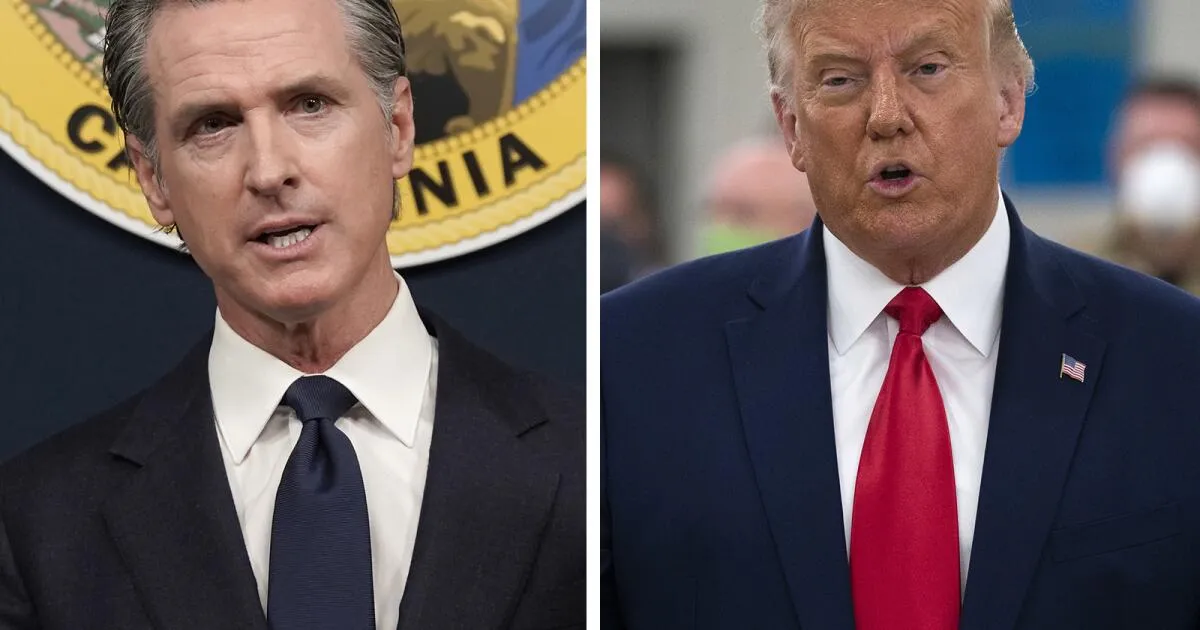
On Wednesday, California Governor Gavin Newsom is set to announce a pivotal lawsuit that contests President Donald Trump’s executive authority to impose international tariffs without the necessary approval from Congress. This legal action, spearheaded by Newsom, aims to challenge the constitutionality of the International Emergency Economic Powers Act, which Trump has cited as justification for implementing these tariffs.
The governor’s office has indicated that the lawsuit will argue that the International Emergency Economic Powers Act does not grant President Trump the unilateral power to adopt tariffs on imported goods entering the United States. Governor Newsom emphasized the negative impact of these tariffs, stating, “President Trump’s unlawful tariffs are wreaking chaos on California families, businesses, and our economy — driving up prices and threatening jobs.” He further asserted the necessity of this legal action to protect American families from the economic turmoil caused by these policies.
This lawsuit marks a significant moment as it is the first time Governor Newsom has taken a prominent role in the numerous legal challenges California has filed against the Trump administration. Until now, California's Attorney General Rob Bonta has been the primary figure in these ongoing legal battles, while Newsom maintained a more reserved stance throughout Trump’s second term. The timing of the lawsuit underscores the growing urgency as California, which engaged in nearly $675 billion in two-way trade last year, stands to face severe economic repercussions from Trump’s tariff policies if international trade declines.
Under the International Emergency Economic Powers Act, President Trump has enforced a baseline tariff of 10% on all imported goods, in addition to heightened taxes on products from Mexico, Canada, and China. Specific levies have also been imposed on various materials such as autos and aluminum. These tariffs not only jeopardize California's economic stability but also threaten the livelihoods of families and businesses across the state, particularly as Mexico, Canada, and China are California's three largest trade partners.
Attorney General Bonta voiced his concerns about the chaotic implementation of these tariffs, stating, “The president’s chaotic and haphazard implementation of tariffs is not only deeply troubling, it’s illegal.” He highlighted the potential fallout from these decisions, affecting everyone from farmers in the Central Valley to small business owners in Sacramento. Bonta stressed that the political games being played by the President have tangible consequences for Californians across the state.
Governor Newsom's office clarified that while the law allows the president to take action in response to a national emergency regarding foreign threats, it does not extend to imposing tariffs. Historically, no president has utilized this act to levy tariffs on specific countries or imported goods in general, according to congressional sources. The forthcoming complaint is expected to assert that the power to impose tariffs lies with Congress, and it will request the U.S. District Court for the Northern District of California to invalidate Trump's tariff orders.
If California is successful in this lawsuit, it could compel Congress to vote on Trump’s tariffs, placing Republican lawmakers in a precarious political position ahead of the midterm elections. Recent polling by CBS News indicates that 58% of Americans oppose the current U.S. tariffs on imported goods, highlighting the potential political fallout for those supporting such measures.
Governor Newsom and Attorney General Bonta are expected to hold a news conference in the Central Valley on Wednesday morning to provide further details about the lawsuit and its implications for California’s economy and families.